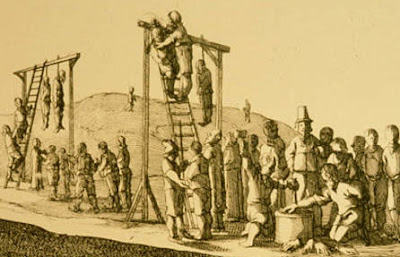The other day I picked up a second-hand copy of Mike Dash's Batavia's Graveyard, a sober, no-nonsense account of what his publishers describe as "history's bloodiest mutiny."
The subject is far from novel for me. I remember as a young boy watching a documentary called "The Wreck of the Batavia" which left me with nightmares for weeks afterwards. I don't know if I've ever quite got over it, in fact: especially some of the reenactments where the chief mutineer's henchmen hunted down their victims with knives in the shallow waters of the reef that surrounded them.
It doesn't surprise me that this film turns out to have been an early work by renowned Australian director Bruce Beresford. There was a horrible authenticity about the live action sequences, in particular, which seems to prefigure the future creator of Breaker Morant, and - in particular - one of my favourite movies of all time, Black Robe.
Another important - though unjustly neglected - work inspired by the event is Australian writer Henrietta Drake-Brockman's novel The Wicked and the Fair, which, despite the garish cover-picture below, is quite an interesting and serious work.
She followed it up with a factual account based on her own extensive local as well as archival research: Voyage to Disaster (1963). Even Mike Dash is forced to admit a considerable debt to this ground-breaking book, though he tempers his admiration for her thoroughness with some rather grudging remarks about her frustrating lack of clear indexing.
Why did this story leave such an indelible mark on me? Recently I've been reading poet Jeremy Roberts' account of his own time in Indonesia - in Jakarta, in fact, the 'Batavia' of the Dutch colonists.
One can read in every line of his book his simultaneous attraction / repulsion for the chaotic city and its teeming sea of inhabitants. I've never visited Indonesia, so can't really comment, but my own travels in Thailand and India give me some hint of what he's talking about - that incommunicable atmosphere one feels in a large sprawling Eastern urban centre, especially at evening, when the heat of the day recedes and everyone comes out on the street to eat and talk.
Of course, though Batavia was the planned destination for the ship, in fact the Batavia itself never got there. It was wrecked off the coast of Western Australia. It's possible, in fact, that two of the mutineers eventually marooned on the mainland were the first Europeans to set foot on the lucky country. Batavia, capital of the Dutch East Indies, is where the rest of the survivors ended up, though.
I suppose that it was the nightmarish revelation of just how far - to what insane and illogical extremes - a truly charismatic leader can go which affected me most about the story. To the very end, even when he stood in front of the gallows, the murderous Jeronimus Cornelisz was still trying to bargain his way out of any responsibilty for what had taken place. The man who had ordered so many deaths for his own amusement could not credit that the same thing might actually happen to him.
In the Bruce Beresford documentary he's described as an Anabaptist - certainly he had idiosyncratic religious views, which included a conviction that any idea that came to him must come from God, and that therefore anything he did, regardless of whether or not it might be considered conventionally "sinful", was ipso facto justified.
The only previous association I had with the word "Anabaptist" came from the Saki story "Sredni Vashtar", where the sickly, neglected boy Conradin has only two friends: "a ragged-plumaged Houdan hen, on which the boy lavished an affection that had scarcely another outlet", and "a large polecat-ferret", which lived in a cage at the back of the tool-shed he spent most of his time in.
And one day, out of Heaven knows what material, he spun the beast a wonderful name, and from that moment it grew into a god and a religion.The Houdan hen, however,
was never drawn into the cult of Sredni Vashtar. Conradin had long ago settled that she was an Anabaptist. He did not pretend to have the remotest knowledge as to what an Anabaptist was, but he privately hoped that it was dashing and not very respectable.Conradin's loathsome guardian Mrs. de Ropp is unimpressed with his choice of a place to play, and announces one morning at breakfast that the hen has been sold and taken away:
With her short-sighted eyes she peered at Conradin, waiting for an outbreak of rage and sorrow ... But Conradin said nothing; there was nothing to be said. Something perhaps in his white set face gave her a momentary qualm, for at tea that afternoon there was toast on the table ...Sredni Vashtar comes through for his worshipper, though. When Mrs. de Ropp goes down to find out just what Conradin has been hiding at the back of the shed ("I believe it's guinea-pigs. I'll have them all cleared away") she gets a little more than she bargained for:
out through that doorway came a long, low, yellow-and-brown beast, with eyes a-blink at the waning daylight, and dark wet stains around the fur of jaws and throat.It's hard not to cheer as the "great polecat-ferret made its way down to a small brook at the foot of the garden, drank for a moment, then crossed a little plank bridge and was lost to sight in the bushes." And yet - much though, like most readers, I relish his triumph - it's disturbing to sense a little of Cornelisz in Coradin, with his great choric hymn:
Sredni Vashtar went forth,
His thoughts were red thoughts and his teeth were white.
His enemies called for peace but he brought them death,
Sredni Vashtar the Beautiful.
























